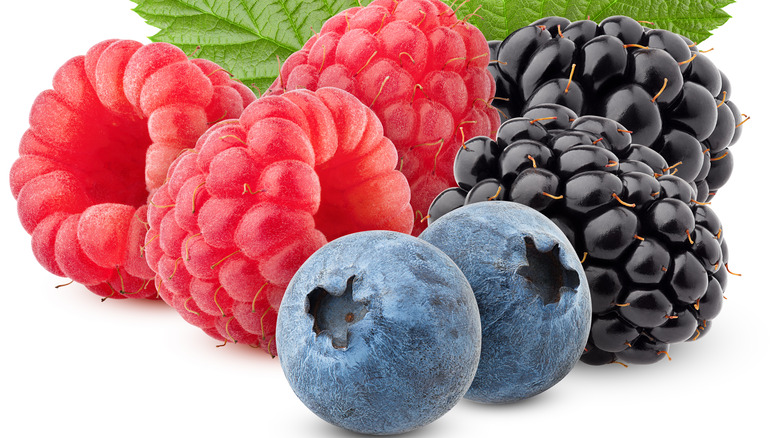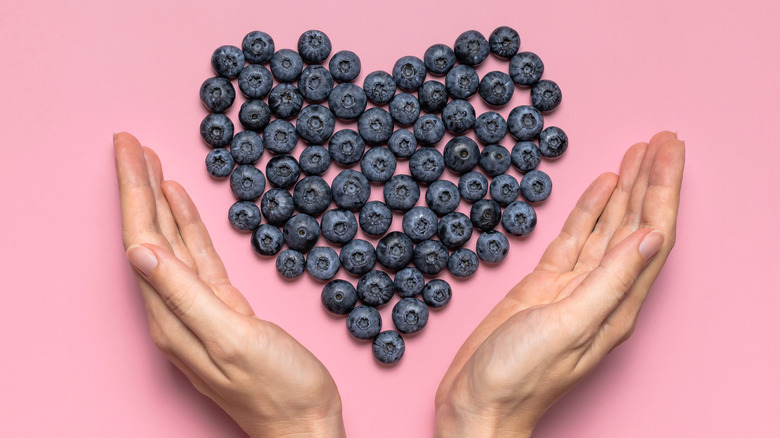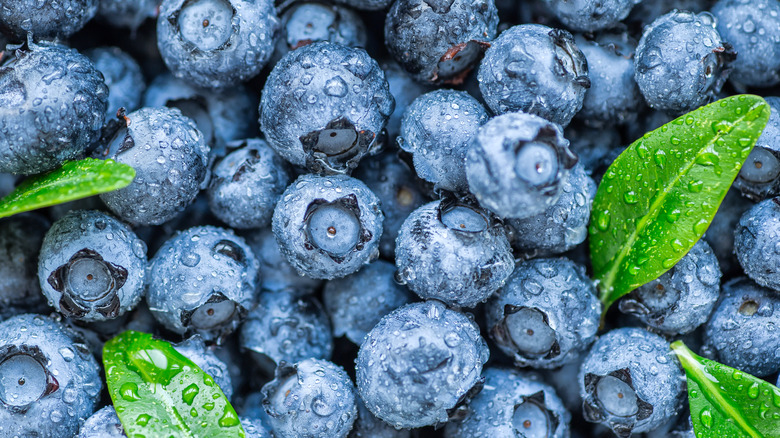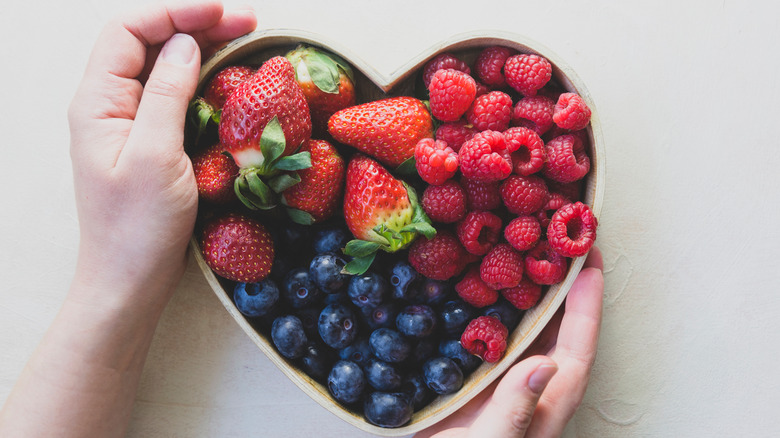When You Eat Berries Every Day, This Is What Happens To Your Body
Berries are some of nature's most delicious and nutritious fruits. They are also among the healthiest foods you can eat, says Healthline. Not only are they low in calories, but they're also loaded with vitamins and minerals, full of fiber to help things move along in the digestive system, and rich in antioxidants that protect your body from disease (via Verywell Fit). Without a doubt, berries are a nutritional powerhouse.
Fruits that are typically referred to as berries (such as strawberries, blueberries, blackberries, cranberries, elderberries, cherries, and currants) should be part of your everyday diet. "Berries should be considered a healthy part of an anti-inflammatory lifestyle for both prevention and chronic disease management," registered dietitian Anna Binder-McAsey, owner of Rethink Nutrition in Manhattan, Kansas, told Everyday Health.
An apple a day is said to keep the doctor away, but will eating a handful of berries do the same? Let's see if these "superfruits" truly are as good as they sound.
You will be mentally sharp
Can berries be fuel for your brain? According to experts, they can. A paper published in Annals of Neurology found strong scientific evidence that berries have beneficial effects on the brain and may help prevent cognitive decline. Researchers examined 6,010 women over 70 years of age and found that those who ate more blueberries and strawberries delayed their cognitive aging by up to 2.5 years. Researchers believe that the participants' slower cognitive decline rate had something to do with their increased anthocyanidin and total flavonoid intake, which were both effects of their berry consumption.
Meanwhile, a 2018 study in the European Journal of Nutrition found that men and women between the ages of 60 and 75 years old who ate the equivalent of a cup of fresh blueberries every day for three months did better on learning and memory tests than those who were given a placebo. Dr. Barbara Shukitt-Hale, study co-author and neuroscientist at the Jean Mayer USDA Human Nutrition Research Center on Aging at Tufts University in Boston, told Consumer Reports that strawberries and raspberries may provide similar benefits based on ongoing research, which means that they could also be powerful learning and memory tools.
Some people lose weight
Looking to speed up your weight loss? Eat some berries, which are low in carbs and high in fiber. One cup of strawberries has 53 calories, while a cup of raspberries has 64 calories. The same amount of blueberries has 83 calories, while blackberries contain 60 calories per cup (via Verywell Fit). Berries are also a good source of soluble fiber, which makes you feel full longer and can help you lose weight. Soluble fiber helps slow down the food as it goes down your digestive tract, decreasing your hunger and making you feel full much faster (per Healthline). As registered dietitian Anne Taylor told the Cleveland Clinic, "All berries are good for you, but blackberries and raspberries have the most fiber."
Next time you feel like picking up a handful of candy, consider grabbing some berries instead. A 2015 study in the journal Appetite examined 12 premenopausal women. Those who had 65 calories' worth of berries as a snack ate less food during their next meal than those who ate a 65-calorie serving of confectionary sweets.
If that didn't convince you to eat berries regularly, then perhaps this 2018 study in the journal Nutrients can. Researchers gathered 27 overweight or obese men and had them eat a high-fat diet, along with either 600 g of blackberries or "a calorie and carbohydrate matched amount of gelatin" per day. Those who consumed the blackberries burned more fat and had improved insulin sensitivity compared to the control group.
It may help prevent urinary tract infections
If you've ever had a urinary tract infection (UTI) –- a common bacterial infection, especially among women — then you were probably told to drink cranberry juice to help reduce your symptoms. That's because cranberries have anti-inflammatory properties. "It is likely that compounds in cranberries help keep bacteria from adhering to surfaces in the bladder," explained Philadelphia-based sports dietitian Kelly Jones to Everyday health. These compounds (phenolic acids and flavonoids) may help decrease inflammation and reduce gut bacteria, and may also decrease the number of bacteria in your bladder and gastrointestinal tract which can lead to UTIs (via Healthline).
Research can back up what you may have been told about cranberries helping with UTIs. A 2017 meta-analysis published in The Journal of Nutrition found that participants who had recurring UTIs reduced their risk of it recurring by 26% through cranberry consumption. Meanwhile, a 2021 meta-analysis published in PLOS One found that "cranberry-based products intake can significantly reduce the incidence of UTIs in susceptible populations," and that the fruit "can be considered as adjuvant therapy for preventing UTIs in susceptible populations."
It can lower your blood pressure
According to Heart.org, almost 50% of all American adults have high blood pressure. If you're one of them, then you're likely on the lookout for a more natural way to control it.
Enter blueberries. In a 2019 study published in The Journals of Gerontology: Series A, scientists found that eating wild blueberries every day for one month increased blood flow and lowered blood pressure. The researchers wrote that the health benefits one can potentially get from blueberries "may be due to vascular effects of anthocyanins that predominantly circulate in blood as phenolic acid metabolites." Put simply, blueberries have particularly high levels of anthocyanins, the compounds from which the fruits derive their dark coloration (via Harvard Health Publishing). The results also showed that anthocyanins boost the function of the body's endothelial cells, which aid in blood flow and blood pressure regulation.
That said, blueberries aren't the only berries you should be consuming every day to help lower your blood pressure. The anthocyanins found in raspberries have been shown to promote vasodilation of blood vessels (per HealthCentral). Vasodilation is when your blood vessels dilate, which decreases your blood pressure.
Berries can have anti-cancer effects
Regular consumption of blueberries may help reduce your risk of cancer, says the American Institute for Cancer Research, citing the fact that the fruit contains "many phytochemicals and nutrients which show potential anti-cancer effects in laboratory studies." Flavonoids are phytochemicals found in berries that can help reduce one's risk of developing diabetes, hypertension, and certain cancers (via Standard Healthcare).
In 2021, nearly 609,000 people in the United States died of cancer, while approximately 1.9 million new cancer diagnoses were recorded (via the American Cancer Society). A 2016 review published in Antioxidants states that low fruit and vegetable intake is one of the five leading dietary and behavioral risk factors leading to cancer deaths. The compounds in berries may help reduce inflammation and protect cells from the DNA damage that may lead to cancer. Researchers found that berries may reduce the risk of several cancers such as breast cancer. They also found evidence suggesting it may curb the development of cancer in the gastrointestinal tract and other hormonal cancers, as well as cancer in the liver, prostate, pancreas, and lungs (albeit to a lesser degree).
It can prevent and help manage diabetes
When it comes to diabetes prevention, the American Diabetes Association says that berries are a "diabetes superstar food." In addition to being an excellent snack option for the sweet-toothed, they're loaded with antioxidants, vitamins, and fiber. Different varieties of fresh fruit have long been a staple in many people's diets due to their well-recognized health benefits. Certain fruits like berries have a low glycemic index, which is good for blood sugar regulation (via Healthline). A 2017 study published in PLOS Medicine looked at the lifestyles of close to 500,000 Chinese adults over an extended period of time. Researchers found that those who consumed fresh fruit daily had a lower risk of diabetes, while diabetic individuals who regularly ate fresh fruit had a lower risk of death.
Berries are a great food choice for people looking to lower their sugar intake or manage their insulin response. According to Hailey Crean, a Massachusetts-based registered dietitian specializing in diabetes care, diabetics would certainly appreciate anthocyanins' potential to reduce the liver's glucose production (per Verywell Health).
If you have diabetes and are unsure about eating berries because of the sugar, don't fret. As Verywell Health states, they provide "particularly valuable health benefits for people with diabetes."
Berries can keep your gut healthy
Many people consume foods with probiotics to help keep their gut healthy. While berries are not a probiotic, they do contain prebiotics that help feed healthy gut bacteria (per the Washington Post). As registered dietitian nutritionist Lacy Ngo told The Healthy: "Blueberries are a wonderful prebiotic to include in your daily diet because they not only promote gut health, but also brain health as well."
A 2020 paper published in the journal Food and Function found that the polyphenols in berries do have an impact on the human gut. Based on the findings, berries have been shown to relieve symptoms of gut inflammation because of compounds that promote beneficial bacteria, which gives them the potential to have a prebiotic-like effect.
Cranberries contain helpful compounds that can help your gut microbiota flourish, says a 2018 study in OMICS: A Journal of Integrative Biology. Researchers conducted a small study of 10 healthy participants and found that sweetened dried cranberries had a positive impact on the natural bacteria in the gut. They found an increase in Bacteroidetes (the "healthy bacteria") as well as evidence of decreased bacteria associated with detrimental health effects.
Berries may lower your cholesterol
When trying to prevent heart disease and reduce your "bad cholesterol," pretty much any kind of berry (blackberries, blueberries, raspberries, pomegranates, or strawberries) are a good choice. Per the Cleveland Clinic, they have low sugar content while being chock-full of soluble fiber.
In fact, daily consumption of berries — whether fresh, in supplement form, or juiced — was associated with a four-point reduction of low-density lipoprotein (LDL) cholesterol (or what many call "bad cholesterol"), according to a 2016 meta-analysis published in Scientific Reports. Blueberries are also full of antioxidants. These can help prevent cholesterol from being oxidized or building up in your body, which can be very dangerous for your heart (per WebMD).
If you like strawberries, they are a great choice to eat every day. In a 2010 study in Nutrition Research, scientists had 27 people with metabolic syndrome consume a freeze-dried strawberry beverage for eight weeks. They found that the participants' strawberry beverage consumption significantly decreased their LDL cholesterol levels.
It may be good for your skin
Being the largest and most visible organ on your body, the skin's primary jobs include acting as a protective barrier from outside elements and helping to regulate your body temperature (per WebMD). The appearance of your skin often gives others clues about how old or how healthy you are. With more and more attention being given on skin health, people are starting to incorporate specific foods into their diets to help keep their skin in great condition.
Blueberries, which are best known for their antioxidants and disease-fighting properties, can be a great addition to your daily diet. As you age, your skin begins to sag, and you may get fine lines and wrinkles. Blueberries can help reduce premature aging. Eating a cup of blueberries a day can also improve your circulation, which is another component of healthier skin. In addition, blueberries may naturally boost collagen because they're high in anthocyanin, which is known to support collagen production (via Healthline).
It can help relieve constipation
Constipation is a common health complaint, with about 16 out of 100 adults experiencing symptoms (per the National Institute of Diabetes and Digestive and Kidney Diseases). People who eat little to no fiber are more likely to become constipated. However, adding more fruits like berries to your daily diet is recommended for constipation relief, says Livestrong.
Increasing your fiber intake through nutritious foods will help things move along in your digestive tract, as well as relieve constipation. According to Medical News Today, consuming strawberries and other foods that are rich in fiber "helps maintain regular bowel movements." As fiber "promotes stool movement through the intestinal tract," increased consumption of it can help you steer clear of constipation.
How much fiber should you be getting? Per the Academy of Nutrition and Dietetics, women need 25 grams of fiber daily, while men should aim for approximately 38 grams. Different berries have different amounts of fiber. For example, one cup of strawberries has 3.3 grams of fiber, while a cup of blueberries has about 3.6 grams. Meanwhile, blackberries have nearly 8 grams of fiber per cup (via Healthline).
Berries may lower your odds of developing heart disease
According to Johns Hopkins Medicine, all kinds of berries are good for your heart because they're rich in antioxidants which can help fight cell damage. The American Heart Association also states that berries have good heart benefits, and lists them as a superfood due to their high levels of flavonoids and association with decreased risk of heart attacks in women.
A 2019 study published in the American Journal of Clinical Nutrition examined 138 overweight subjects with metabolic syndrome aged 50 to 75 and their blueberry consumption over the course of six months. Researchers found that eating 1 cup of blueberries daily can reduce your risk of cardiovascular disease by up to 15%. "We found that eating one cup of blueberries per day resulted in sustained improvements in vascular function and arterial stiffness — making enough of a difference to reduce the risk of cardiovascular disease by between 12 and 15 percent," said study co-lead researcher Dr. Peter Curtis. However, they found no benefit when participants were given only half a cup of blueberries per day, which means a cup a day may be needed for at-risk populations.
It can help keep your eyes healthier
When you eat berries every day, you're helping to keep your eyes healthier. As you age, your vision may change. However, eating berries daily may help prevent and treat cataracts. A cataract is a film that forms on the lens of your eye and makes everything look cloudy (via Mayo Clinic). Berries are full of antioxidants which can help slow the growth of cataracts as well as age-related macular degeneration (AMD), which translates to vision loss in older people (per WebMD).
In fact, a 2022 study from the University of California-Davis found that a daily serving of dried goji berries may help prevent or delay AMD. The researchers had 13 healthy participants consume a handful of dried goji berries five times a week for about three months. They discovered that the density of the protective pigments in the subjects' eyes had increased, which is what helps protect the eyes during the aging process.
Macular degeneration expert Dr. Johanna Seddon told AARP that blueberries are abundant sources of anthocyanins, described as "potent antioxidants that bolster collagen structure in the retina and provide extra vision protection." The anthocyanins found in berries can help protect the retina from exposure to ultraviolet light, which is particularly beneficial for people who spend a lot of time outdoors.
Your immune system is given a boost
Consuming berries every day helps you boost your immune system. Due to the sheer amount of vitamins, minerals, antioxidants, and flavonoids such as anthocyanin that they contain, berries can bolster your body's natural defenses against diseases and infections (via Medical News Today). In a 2016 study published in the journal Advances in Nutrition, researchers found that people who ate flavonoid-rich foods like blueberries were less like to get upper respiratory tract infections (URTIs) than those who did not.
Did you know that a large part of your immune system is located in your gut? A 2018 paper published in Nutrition Reviews examined the health effects of berries in the digestive tract, and found evidence that the fruits "can serve as a strong adjuvant to established treatments or therapies for a variety of gastrointestinal and immune-related illnesses."
Additionally, elderberries are known for their healing benefits because they are packed with antioxidants and vitamins that may boost your immune system, says WebMD.
It can help muscle recovery after a workout
Have you ever woken up after an intense workout feeling so sore that you had trouble getting out of bed? This is what experts in a 2019 study referred to as exercise-induced muscle damage (EIMD). Put simply, it's when you have increased soreness and swelling in your muscles from doing an unfamiliar workout.
A 2012 study in the Journal of the International Society of Sports Nutrition focused on 10 female athletes to examine if blueberries were an effective treatment to reduce EIMD or muscle soreness. For each of the athletes, the researchers exposed one leg to "eccentric exercise" to induce EIMD. Participants were given either a blueberry smoothie or a placebo 5 and 10 hours before the experiment, as well as 12 and 36 hours after. Several weeks later, the test was repeated on each athlete's other leg.
The study found that while both groups had a "significant" decrease in peak torque after 12 hours, during the 60-hour recovery period, participants had a faster rate of recovery when they had the blueberry smoothie. Per the results, consuming blueberries "induces cellular adaptive events" to help hasten muscle repair and recovery. Moreover, the anthocyanins in blueberries may have a positive impact on athletes' recovery from EIMD. More research is required to verify this, though.















